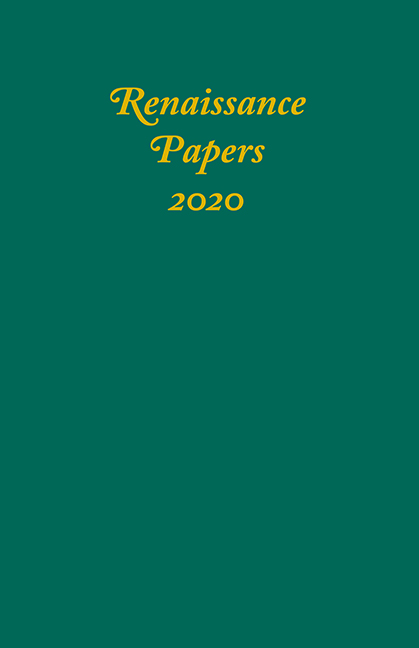Book contents
- Frontmatter
- Contents
- Renaissance Papers
- Post-Marian Piety in Edmund Spenser’s Faerie Queene: The Case of Belphoebe
- Confessions and Obfuscations: Just War and Henry V
- Unfinished Epics: Spenser's Faerie Queene, Shakespeare's Henriad, and the Mystic Plenum
- Translating and Fragmenting Nature in The Divine Weeks
- “The beautifullest Creature living”: Cross-dressing Knights in Mary Wroth's Urania and Margaret Tyler's Mirror of Princely Deeds
- “’Twas I that murder’d thee”: Heartbreak, Murder, and Justice in Early Modern Haunted Lovers’ Ballads
- “Love at First Sight”: The Narrator's Perspective in Marlowe's Hero and Leander
- Recentering the Forest in Early Modern England
- “The house received all ornaments to grace it”: Cavendish, Lanyer, and the Cavalier Ideal of Bonum Vitae
- A Gentleman of Syracuse: Claudio Mario D’Arezzo and Sicilian Nationalism in the Early Modern Mediterranean
- Make Your Mark: Signatures of Queens Regnant in England and Scotland during the 16th Century
Translating and Fragmenting Nature in The Divine Weeks
Published online by Cambridge University Press: 26 May 2022
- Frontmatter
- Contents
- Renaissance Papers
- Post-Marian Piety in Edmund Spenser’s Faerie Queene: The Case of Belphoebe
- Confessions and Obfuscations: Just War and Henry V
- Unfinished Epics: Spenser's Faerie Queene, Shakespeare's Henriad, and the Mystic Plenum
- Translating and Fragmenting Nature in The Divine Weeks
- “The beautifullest Creature living”: Cross-dressing Knights in Mary Wroth's Urania and Margaret Tyler's Mirror of Princely Deeds
- “’Twas I that murder’d thee”: Heartbreak, Murder, and Justice in Early Modern Haunted Lovers’ Ballads
- “Love at First Sight”: The Narrator's Perspective in Marlowe's Hero and Leander
- Recentering the Forest in Early Modern England
- “The house received all ornaments to grace it”: Cavendish, Lanyer, and the Cavalier Ideal of Bonum Vitae
- A Gentleman of Syracuse: Claudio Mario D’Arezzo and Sicilian Nationalism in the Early Modern Mediterranean
- Make Your Mark: Signatures of Queens Regnant in England and Scotland during the 16th Century
Summary
IN the past two decades, John Milton's Paradise Lost has found itself at the center of scholarship focused on both ecology and science in the early modern period. Milton has become celebrated as something of a proto environmentalist, perhaps even an experimental philosopher. Milton's epic has proven so rich for these intersecting fields because it derives from the period's central text for understanding humanity's relationship to nature: Genesis. The scriptural account of creation, too, has been crucial for ecocritical studies of the early modern period, particularly as critics examined issues of human “dominion” and natural knowledge. Creation, in this scholarship, has provided fruitful grounds for scholars interested in thinking through the entanglements between early modern religion, the new philosophy, and the ecological outlook of both early moderns and our contemporaries.
Less attention, however, has been devoted to the environmental outlook of the other massively popular epic of creation in early modernity: Du Bartas's La Sepmaine, known most often in England through Josuah Sylvester's translation, The Divine Weeks and Works. If mentioned at all, Du Bartas is generally held up as a retrogressive example against which to illuminate Milton's achievements, as in Karen Edwards's account of Milton's natural history. And certainly, the epic is often conservative and reactionary, as in its condemnation of Copernican astronomy; apparently critical of the new philosophy more generally, Du Bartas's work suggests at times how unreliable sensory knowledge can be. Despite its relative obscurity now, however, The Divine Weeks, at least arguably, engaged much more directly with changing ideas about the natural world and humanity’s place within it. In fact, as Peter Auger has shown, English responses to the work during the period categorized the poem as an epic poem about natural philosophy and natural history. Du Bartas, moreover, was praised as one of the most learned botanists of his day, and his poems cataloging plants and animals, including the vegetation of the Americas, were known to other natural historians. Scholars of science have reminded us often that no line in the period separated literary and scientific writing, and Du Bartas participates directly in the emerging conversation in natural history.
- Type
- Chapter
- Information
- Renaissance Papers 2020 , pp. 37 - 48Publisher: Boydell & BrewerPrint publication year: 2021



